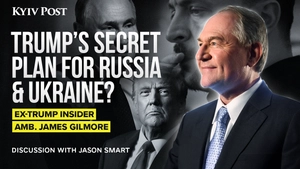Vladimir Putin starts his fifth presidential term buoyed by minor reported battlefield successes in Ukraine and dubious claims of sustained economic growth, despite Western sanctions.
In his Tuesday, May 7 acceptance speech at the Grand Kremlin Palace, Putin emphasized the need for Russia's state system to be flexible while ensuring the “stability of development.”
JOIN US ON TELEGRAM
Follow our coverage of the war on the @Kyivpost_official.
He hailed his recent election victory as the “consolidated will of millions” and a “colossal force.”
“The Russian authorities are attempting to give the entire world and its own citizens the illusion of legality for the nearly lifelong stay in power of a person who has turned the Russian Federation into an aggressor state and the ruling regime into a dictatorship,” Ukraine’s Ministry of Foreign Affairs stated.
Putin's victory in the March presidential election, held amid war, censorship, repression, media control, and opposition suppression, saw him secure over 87 percent of the vote, according to official data.
Today’s ceremony, much like Putin's 2018 inauguration, saw him arrive at the Grand Kremlin Palace in the “Aurus Senate” limousine of the “Cortege” project, accompanied by outriders on electric motorcycles.
The highly orchestrated inauguration ceremony, which included a military procession and Orthodox prayer service, was broadcast live on all major Russian television channels.

Who Is The Dictator? Americans Say Trump Is
“We are a united and great nation, and together we will overcome all obstacles, realize everything we have planned, and together, we will win,” the Russian leader said after being sworn in to office.
Despite criticism from the West about lack of fairness and freedom in Russia's elections, Putin focused on the legitimacy of his victory, stating that it reaffirmed the country's chosen path amid “challenging times.”
The European Parliament deemed the election results illegitimate and undemocratic, calling on EU countries to reject Putin as an illegal president. The US, UK and Canada along with most EU countries refused to send representatives, although Hungary, Slovakia Greece, Cyprus, Malta and most surprisingly France did attend – saying they saw the event as a chance to keep lines of communication with the Kremlin open.
The Parliamentary Assembly of the Council of Europe (PACE) had already recognized Russia as a dictatorship and called on all Council of Europe states not to recognize him at the end of his last term.
The ceremony concluded with a performance of “Hail” from Mikhail Glinka's opera “Life for the Tsar” and a salute from 76mm ZIS-3 field guns.
Meanwhile, Yulia Navalnaya, widow of opposition leader Alexei Navalny, criticized Putin's presidency in a video message.
“Our country is being led by a liar, a thief, and a murderer. But this will definitely come to an end,” Navalnaya, who lives in exile, said in a video.
Navalnaya said that Putin's previous term was marked by a “war that is bloody and senseless” and ever-increasing political repression in Russia.
“There are several hundred political prisoners in Russia enduring inhumane conditions,” she said. “New cases are being opened every day.”
As is customary Putin's government resigned, following his inauguration, and he is expected to appoint a new prime minister who in turn will select government members – subject, of course, to Putin’s approval. The State Duma is set to approve Putin’s nomination for prime minister's on May 10.
After the formal part of the ceremony, Putin attended a review of the Presidential Regiment and joined a prayer service at the Annunciation Cathedral of the Kremlin, served by Patriarch Kirill.
“May God help you continue carrying out your servitude that he himself has entrusted on you,” the Orthodox leader said. He compared Putin to medieval ruler Alexander Nevsky and wished him eternal rule.
“Serving Russia is a huge honor, responsibility and sacred duty,” Putin had said in the Kremlin's gilded Saint Andrew's Hall.
On the home front, he overcame challenges from paramilitary chief Yevgeny Prigozhin last June, who later died in a plane crash, and in February, the leader of his main opposition, Alexei Navalny, died in prison.
Putin's victory in March positions him to become Russia's longest-serving leader in a century, surpassing even Soviet dictator Joseph Stalin.
You can also highlight the text and press Ctrl + Enter














